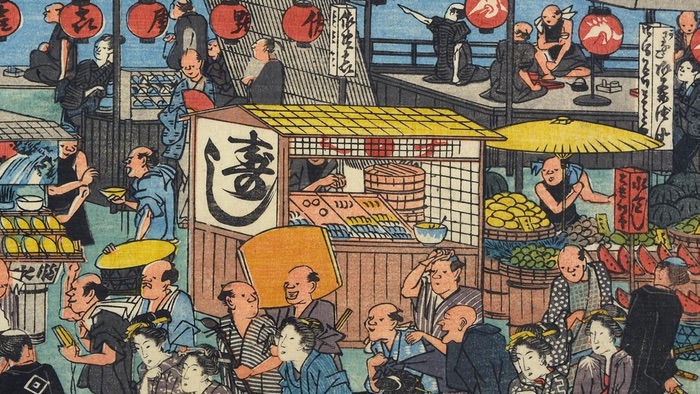
Podcast: Play in new window | Download (Duration: 25:29 — 23.5MB)
Subscribe: Google Podcasts | Spotify | Android | RSS | More

Eric Rath’s history of sushi traces the word back to its origins as a method of preserving fish through many twists and turns to today, when sushi means almost anything you want it to mean.
Notes
- Eric Rath’s book Oishii: The History of Sushi is published by Reaktion Books. It contains recipes old and new, in case you want to try making sushi at home.
- National Geographic surprised me with this article in early September: These popular tuna species are no longer endangered, surprising scientists.
- A popular culture view of modern sushi that I did not mention, precisely because it lives up to all possible stereotypes, is the amazing sequence in Wes Anderson’s Isle of Dogs. Almost more astonishing is the dedication that went into making it.
- Here is the transcript, thanks to the generosity of the show’s supporters.
- The banner image is a detail from Utagawa Hiroshige’s Amusements While Waiting for the Moon on the Night of the Twenty-sixth in Takanawa, which dates from the 1820s, with thanks to the British Museum (CC BY-NC-SA 4.0). The cover image is a detail from Bowl of Sushi, also by Hiroshige. I have not been able to date it.


 Tomoca Coffee House in Addis Ababa is a lasting reminder of the Italian occupation of Ethiopia. When I visited, almost 10 years ago, a somewhat ancient machine was producing terrific cups of espresso for a huge crowd, and they were doing a roaring trade in beans too. Tomoca is in some ways a symbol not just of Ethiopian coffee, but also of the Italian connection and, at one remove, of the way that coffee ties Italy and Ethiopia to Brazil.
Tomoca Coffee House in Addis Ababa is a lasting reminder of the Italian occupation of Ethiopia. When I visited, almost 10 years ago, a somewhat ancient machine was producing terrific cups of espresso for a huge crowd, and they were doing a roaring trade in beans too. Tomoca is in some ways a symbol not just of Ethiopian coffee, but also of the Italian connection and, at one remove, of the way that coffee ties Italy and Ethiopia to Brazil.